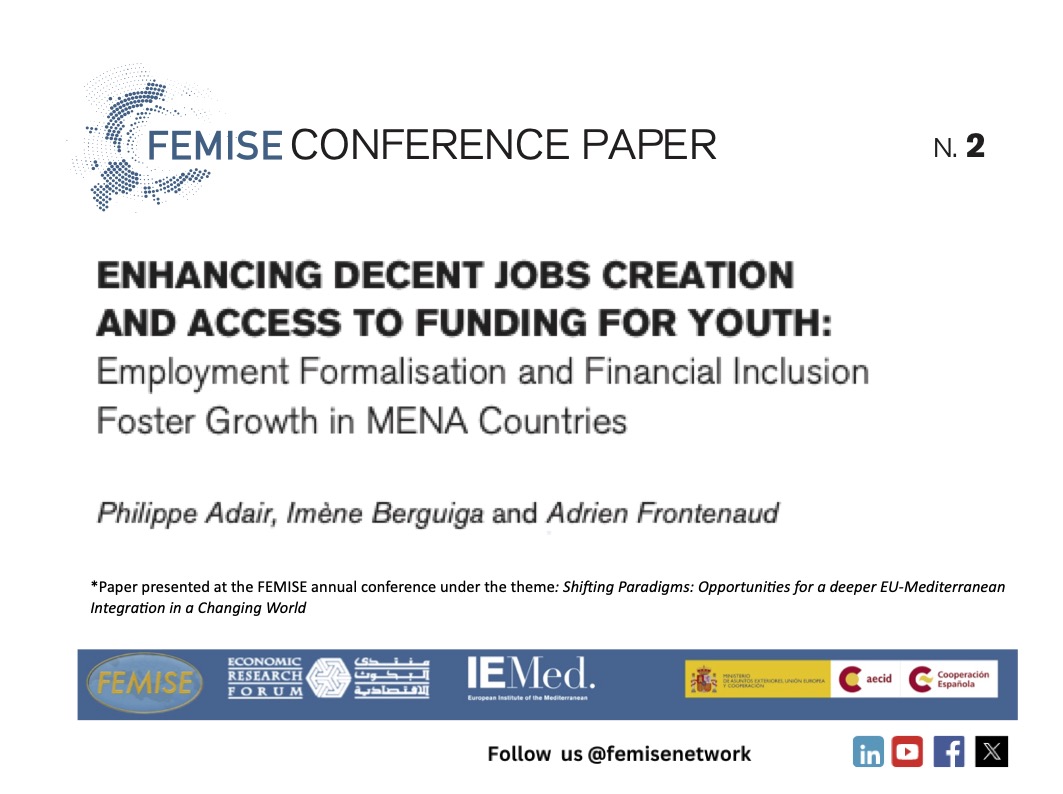Summary :

Informal employment (informality) and financial exclusion are linked and prove detrimental to inclusive growth. Informality is characterised by low productivity, which hampers growth and harms the welfare of workers. Financial exclusion slows down household savings and consumption, deteriorating well-being and holding back the growth of micro (informal) businesses due to shortage in funding working capital. Hence, promoting formalisation and financial inclusion is a means of fostering youth economic empowerment, especially for women.
In MENA countries wherein informality exceeds 50 per cent of the labour force, 24 per cent of the population is aged 15-29 and unemployment is the highest worldwide, whereas female participation to the labour force is the lowest. Two youths out of three are financially excluded.
The paper aims at investigating the following threefold issues: Why youths in MENA countries (i) face pervasive informal employment and unemployment, and (ii) lack financial inclusion? and (iii) What are the relevant policies formalising informality and promoting financial inclusion? With respect to inclusive growth for youths, all three issues are linked.
The first section is addressing employment dynamics in terms of transitions between employment, unemployment, and inactivity in Egypt and Jordan for the youth aged 15-34 years old. Job categories include formal/informal wage employment and formal/informal self-employment. Logistic regressions focus upon individual characteristics (gender and education) and industries. Last, it tackles the job quality issue. In Egypt, persistent informal jobs and low occupational mobility remain, whereas shifts towards formality, self- employment, unemployment, and inactivity depend on gender. In Jordan, labour market dynamics is strongly affected by female inactivity.
The second section is dedicated to financial inclusion for youths aged 15-34 from Egypt, Jordan and Tunisia as for 2014, 2017 and 2021. Two probit regressions address financial inclusion regarding account holding and the use of digital services (fintech). According to outcomes from the analysis, prior to the pandemic, young employees and entrepreneurs are financially included. During the pandemic, the financial gender gap declines, while there is no age gap for fintech use. However, gender and countries variables reduce account holding by young entrepreneurs, whereas middle income and low education level lessen fintech use.
In the third section, persistent labour market segmentation is evidenced by income gaps with respect to gender and job status. Policies include those influencing formalisation (growth and education strategies) vs those carrying explicit formalisation objectives, which use transversal drivers (enforcing labour regulations and social protection), targeting categories (micro businesses), bringing workers under the scope of labour regulations (young entrepreneurs, female workers). Schemes include incentives such as social protection, vocational training and financial services that prove effective, together with enforcing the law and regulations.Impact assessment displays rather modest outcomes. The EU may provide assistance in several ways.
Noteworthy is that this note is using both representative panel data sets for Egypt (2012-2018) and Jordan (2010-2016) as well as cross-sectional surveys that are representative for the two aforementioned countries, plus Tunisia, addressing the same youth categories within a similar time-frame over the 2010s.
The abstract is also available in French and Arabic
Keywords: Entrepreneurship; Financial inclusion; Formalisation policies; Gender; Impact assessment; Labour market; Logistic regressions; Occupational mobility; Probit regressions; Segmentation.

